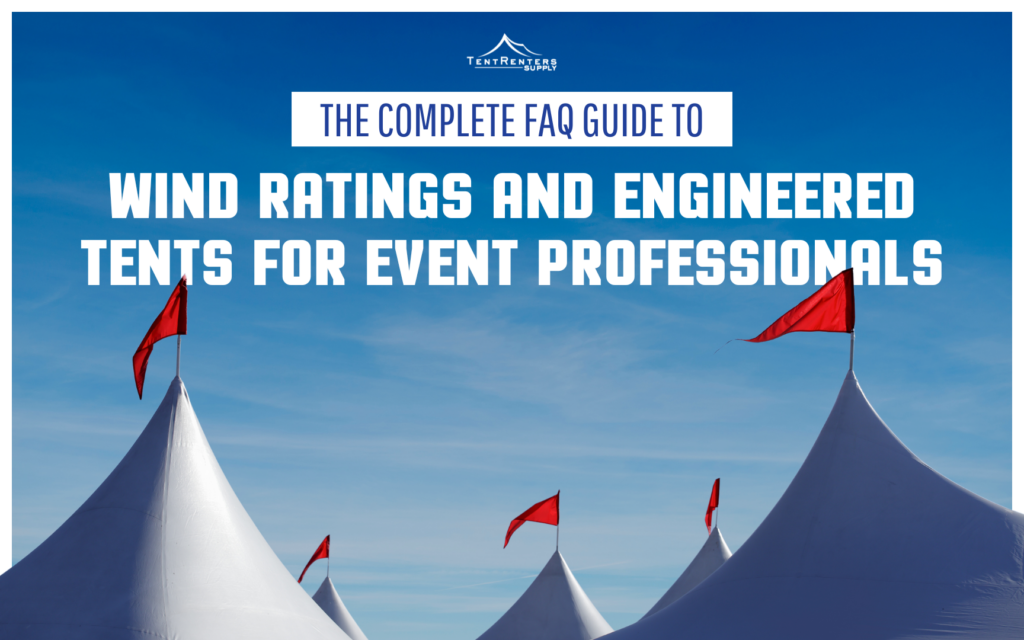Event Tents, Tent Basics, tent material
The Complete FAQ Guide to Wind Ratings and Engineered Tents for Event Professionals
How much thought have you given to wind?
For outdoor event professionals, wind is a critical factor in ensuring the success and safety of your event. With weather being as unpredictable as ever, understanding wind ratings and the role of engineered tents has gone from a “nice-to-have” to a necessity for responsible and successful event planning.
At Tent Renters Supply, we’ve worked with countless event professionals who face these exact challenges. This guide will answer all your top questions about wind ratings, engineered tents, and how to protect your event with proper planning.
What Are Wind Ratings for Event Tents?
Definition and Significance
Wind ratings measure the maximum wind speed that a tent can withstand before it’s considered unsafe. These ratings are critical for outdoor venues where wind can present risks to safety, equipment, and the overall success of the event.
For example, a tent rated for 40 mph winds will hold up during a breezy afternoon but may pose risks during gusty storms. Knowing this information upfront can help protect your guests and equipment while ensuring compliance with safety regulations.
Why It Matters
Wind ratings are a crucial safety measure. Without understanding them, event organizers expose themselves to liability, expensive damage, and, worst of all, compromised guest safety.
Why Are Engineered Tents Essential for Event Safety?
Engineered vs. Non-Engineered Tents
Engineered tents are designed and tested to meet strict safety and compliance standards. They are certified by licensed engineers and come with documentation outlining their structural integrity and wind resistance. Non-engineered tents, while often more cost-effective, do not offer the same reliability under high winds.
When Do You Need an Engineered Tent?
For events in windy locations (beachfront, open fields, etc.) or areas with strict regulations, an engineered tent is a must. For example, a music festival in the Midwest, where strong gusts are common, will require an engineered tent to withstand sudden weather shifts.
How Are Wind Ratings Determined for Tents?
Wind ratings depend on multiple factors:
- Materials: Durable fabrics like vinyl and reinforced pole systems improve wind resistance.
- Tent Design: Aerodynamic designs, such as high-peak tents, reduce wind impact compared to flat-roofed designs.
- Anchoring: Stakes, weights, and tension systems are crucial for stability (more on this later).
- Testing and Certification: Certified engineers test tents against wind tunnel simulations and other environmental factors to issue their wind rating.
What Factors Affect Wind Ratings for Event Tents?
Several factors should be considered when evaluating a tent’s wind rating:
1. Location & Weather Conditions
A tent designed for a beachside wedding will need different wind ratings than one used in a woodsy festival. Conduct a site-specific analysis for the best results.
2. Anchoring Systems
Without proper anchoring, even the most advanced tent design can fail. Use appropriate weights or stakes based on your terrain and weather conditions.
3. Tent Size & Structure
Larger tents often require additional structural reinforcements to maintain stability under high winds.
What’s the Difference Between Engineered and Non-Engineered Tents?
| Engineered Tents | Non-Engineered Tents |
| Certified and tested for safety | Not certified for specific safety standards |
| Designed to withstand specific wind speeds | Unknown wind capacity |
| Can be suitable for high-risk locations/events | Best for low-risk, controlled environments |
| Higher upfront cost but greater reliability | Lower cost, limited situations |
Engineered tents say, “We’ve got your back, no matter what.” Non-engineered tents? They’re more of a “use at your own risk” product.
How to Choose the Right Tent Based on Wind Rating
Follow these steps to make an informed decision:
- Assess Your Venue
Identify whether your location is prone to strong winds. Beachside? Likely windy. Protected garden? Probably less risk.
- Understand Event Needs
Large crowd? Critical tech equipment? Choose higher-rated, engineered tents to ensure safety.
- Consult the Pros
Partner with experienced tent manufacturers like Tent Renters Supply to get the right solution.
What Should You Know About Tent Anchoring for Wind Resistance?
Proper anchoring is non-negotiable. Without it, even the best-engineered tent can collapse.
Best Practices for Anchoring:
- Use heavy-duty weights or stakes suitable for your soil type.
- Double-check anchoring systems before and after setup.
- Anticipate weather conditions and have backup measures ready.
Why Are Wind Ratings Especially Crucial in Different Locations?
Wind conditions vary dramatically by region. Here are some considerations:
- Coastal Areas
Gusty and unpredictable winds demand higher-rated tents.
- Midwest Plains
High winds on flat terrain necessitate sturdy engineering and anchoring.
- Urban Areas
Wind tunnels between high-rises can create localized challenges.
How Much Do Engineering Documents for Tents Cost?
The cost of engineering documents depends on:
- Tent size and complexity
- Regional regulations
- Site-specific customization needs
While costs may range from $500 to $1,500 or more, this investment ensures legal compliance, operational safety, and peace of mind.
Best Practices for Severe Weather Preparedness
Severe weather can strike unexpectedly. Here’s how to prepare:
- Monitor forecasts leading up to the event.
- Establish a contingency plan for relocating guests indoors.
- Partner with trusted manufacturers like Tent Renters Supply, who can guide you with documentation suited for severe weather.
How Can Tent Renters Supply Help?
Tent Renters Supply specializes in providing high-quality engineered tents backed by expert advice and certification. Our wide range of tents meets stringent safety standards, offering peace of mind for every event. Visit Tent Renters Supply to explore further.
Take the Stress Out of Outdoor Events
Understanding wind ratings, engineered tents, and safety measures isn’t just about compliance—it’s about creating unforgettable experiences that are as secure as they are seamless. Outdoor events should be memorable for all the right reasons.
Contact Tent Renters Supply for professional guidance and top-tier solutions to keep your events safe, stylish, and successful.

